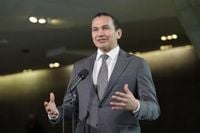As the trade tensions between the United States and Canada escalate, Canadian leaders are bracing for the economic impact of new tariffs announced by U.S. President Donald Trump. On March 27, 2025, Kevin Page, the former parliamentary budget officer, expressed concerns about a potential recession in Canada, attributing it to Trump’s ongoing tariff wars. Page remarked, “The geopolitical uncertainties could have a worse impact,” highlighting how these trade disputes could lead to decreased consumer spending as people grow wary of the economic outlook.
In his interview, Page emphasized that while the economy may face challenges, Canada is not on the brink of collapse. He pointed out that Ottawa is in a relatively strong financial position, with debt-to-GDP ratios that are significantly better than those of the United States. “Our debt to GDP numbers are better than other countries, much, much better than the United States,” he noted. This financial resilience, he argued, allows the Canadian government to act as a shock absorber during economic downturns, potentially supporting the hardest-hit sectors and workers.
Meanwhile, in Manitoba, Premier Wab Kinew announced a proactive measure to assist local businesses facing the impending tariffs. Kinew stated that the province is allocating $1.5 million to the Canadian Manufacturers & Exporters trade association to develop a “made-in-Manitoba” program aimed at providing tariff response support. This initiative is designed to help manufacturers diversify their markets and mitigate the financial impacts of the tariffs.
“We want to make it easier for businesses to weather the storm of U.S. tariffs,” Kinew said, underscoring his commitment to supporting Manitoba workers and businesses. Terry Shaw, a representative from the trade association, explained that the program would equip manufacturers with essential tools to navigate the challenges posed by the tariffs, including financial support for tariff planning consultations.
The tariffs, which Trump has stated will be imposed on all foreign imports, are set to take effect next week. This move is part of a broader strategy by the U.S. administration, which has already implemented a 25% tariff on many goods from Mexico and Canada, along with a 10% tax on energy products from Canada.
A recent analysis by the Canadian Chamber of Commerce revealed that U.S. cities most vulnerable to the trade war are primarily located in states that supported Trump in the last presidential election. San Antonio and Detroit were identified as the metro areas most dependent on exports to Canada, with nearly half of San Antonio's exports and about 40% of Detroit's exports destined for the Canadian market.
The analysis was conducted prior to Trump’s announcement of additional tariffs on imported autos and parts, which are scheduled to start on April 3, 2025. Candace Laing, president and CEO of the Canadian Chamber of Commerce, warned that the escalation of the tariff war could lead to significant job losses on both sides of the border. “Throwing away tens of thousands of jobs on both sides of the border will mean giving up North America’s auto leadership role,” Laing stated, cautioning that the tariffs could incentivize companies to relocate production elsewhere.
In addition to the immediate economic concerns, Canadian leaders are also voicing worries about the long-term consequences of the trade war. While Trump has cited illegal immigration and drug smuggling as reasons for the tariffs, the economic fallout could be felt more acutely in Canada and Mexico, both of which rely heavily on trade with the United States. An analysis by the Brookings Institution noted that the economic pain would be more severe for these countries compared to the U.S.
As the situation unfolds, the Canadian government is preparing to navigate these turbulent waters. With Page’s insights into Canada’s fiscal resilience and Kinew’s commitment to supporting local businesses, there is a sense that Canada is poised to weather the economic storm, albeit with challenges ahead.
In the face of potential recession and escalating tariffs, the Canadian government’s response will be crucial in determining how well the economy can adapt to the changing trade landscape. The coming weeks will reveal the extent of the impact from these tariffs and how both Canadian businesses and consumers respond to the shifting economic conditions.
As the trade war intensifies, the interconnectedness of the U.S. and Canadian economies serves as a reminder of the potential repercussions of tariff policies. With both countries facing uncertainties, the hope remains that diplomatic solutions can be found to mitigate the adverse effects of these trade disputes.






